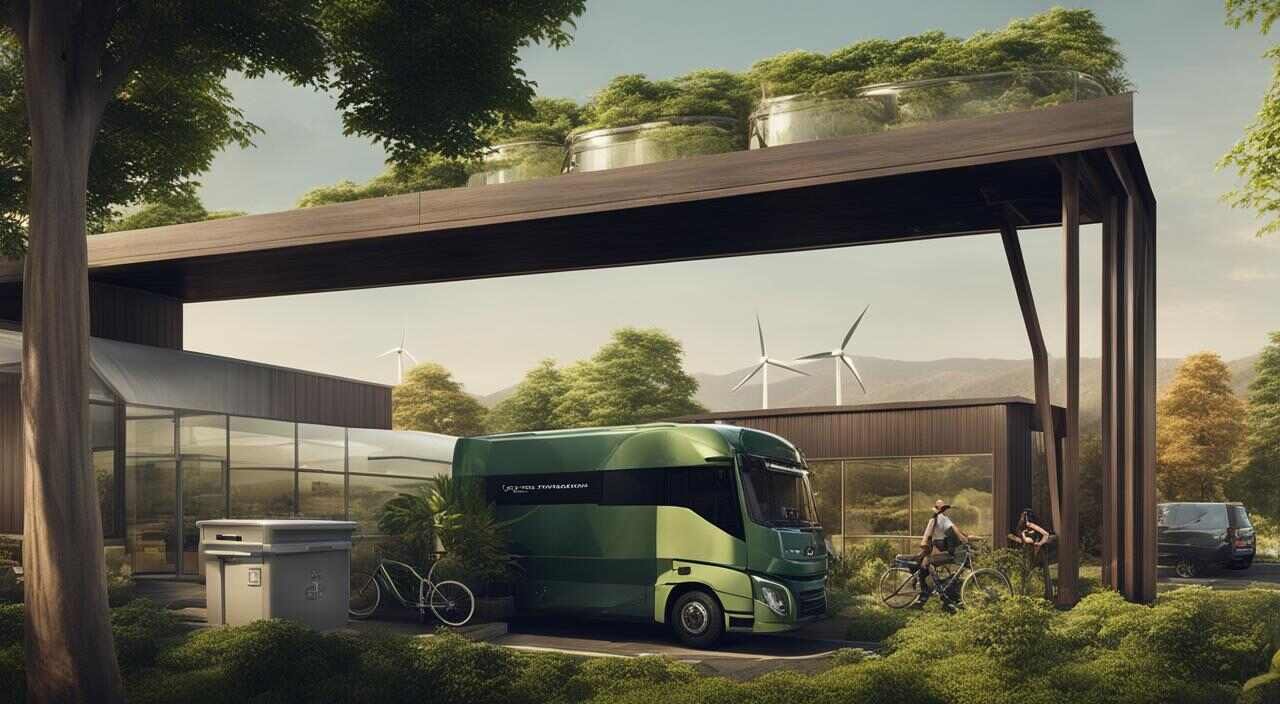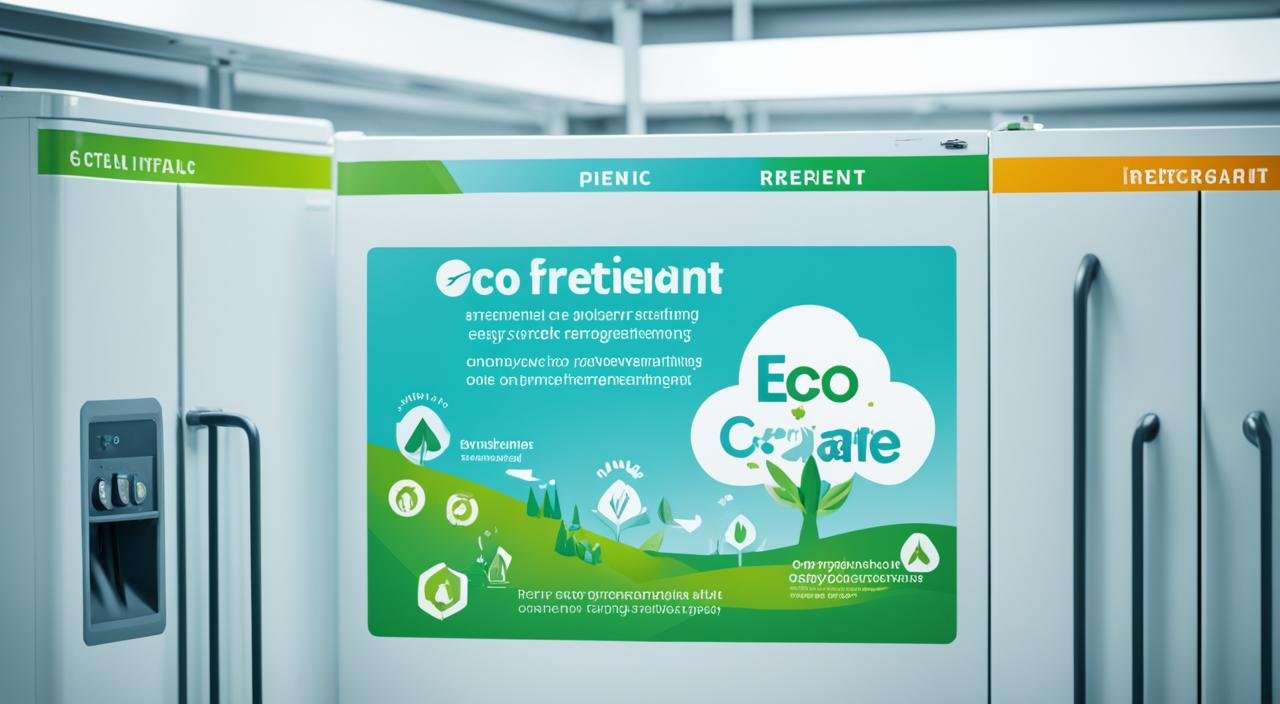Today’s consumers are not only interested in products and services, but also in the corporate social responsibility practices of businesses. This presents a great opportunity for eco-minded entrepreneurs to start businesses that prioritize sustainability and make a positive environmental impact. In this article, we will explore 23 eco-friendly business ideas that can help you make a difference while making money.
Key Takeaways:
- Eco-friendly businesses prioritize sustainability and make a positive environmental impact.
- There are 23 eco-friendly business ideas that can help you make a difference while making money.
- Starting an eco-friendly business is an opportunity to inspire change and contribute to a greener future.
- By implementing sustainable practices, you can promote eco-consciousness and environmental responsibility.
- Eco-friendly businesses appeal to environmentally conscious consumers and can be profitable in today’s market.
Ink Refill Business
If you’re looking for a profitable business venture that aligns with eco-friendly practices, starting an ink refill business is an excellent choice. By offering ink cartridge refill services, you can contribute to sustainable printing practices and reduce the amount of nonbiodegradable waste in landfills.
With the rising demand for eco-friendly printing solutions, there is a growing market for ink refill services. Many businesses and individuals are embracing sustainable printing practices to reduce their environmental impact. By providing a convenient and cost-effective way to refill ink cartridges, your business can help them achieve their sustainability goals.
In addition to reducing waste, ink refill businesses also promote the efficient use of resources. Instead of purchasing new ink cartridges, customers can choose to refill and reuse their empty cartridges, significantly reducing the consumption of raw materials and energy required to produce new ones.
An ink refill business can offer various benefits, including:
- Cost savings for customers compared to buying new cartridges
- Convenience, with quick and efficient refill services
- Eco-friendly printing options that appeal to environmentally conscious consumers
- Reduced carbon footprint through cartridge recycling and waste reduction
By emphasizing the eco-friendly aspects of your ink refill business, you can attract a wide range of customers who value sustainability and responsible printing practices. Consider partnering with local businesses, schools, and organizations to expand your customer base and promote your services.
As with any business, it’s important to prioritize quality and customer satisfaction. Invest in high-quality ink and equipment to ensure that your refilled cartridges perform as well as, if not better than, new cartridges. Offering guarantees or warranties on your refill services can also help build trust and confidence in your business.
With the right marketing strategies and a commitment to eco-friendly practices, your ink refill business can thrive in the growing market of sustainable printing solutions. Start making a positive impact on the environment while providing a valuable service to your customers.
Environmental Publications
If you love to write and have a passion for the environment, starting your own environmentally minded publication can make a big difference. Through your publication, you can debunk myths, share the truth about the world we live in, and educate consumers about how their actions impact the planet.
Environmental publications serve as valuable resources for individuals seeking information and inspiration to lead a more eco-friendly lifestyle. By creating content that is informative, engaging, and thought-provoking, you can attract a wide readership and become a trusted source of environmental knowledge.
Your publication can cover a wide range of topics, including sustainable living, climate change, organic gardening, wildlife conservation, and more. By exploring these subjects in your articles, you can empower readers to make informed choices and take action towards a greener future.
Debunking Myths and Promoting Truth
One of the important roles of environmental publications is to debunk common misconceptions and myths surrounding environmental issues. Many individuals are misinformed or have limited knowledge about topics such as renewable energy, recycling, or the impact of their daily activities on the environment.
By using credible research, providing accurate information, and debunking myths, your publication can help dispel misinformation and provide readers with the facts they need to make environmentally conscious decisions.
Educating Consumers about Environmental Impact
Environmental publications play a crucial role in educating consumers about the impact of their actions on the planet. By highlighting the consequences of unsustainable practices and emphasizing the benefits of eco-friendly alternatives, you can inspire readers to make positive changes in their lives.
Through informative articles, you can educate readers about topics such as reducing waste, conserving energy and water, supporting sustainable businesses, and making conscious consumer choices. By presenting actionable tips and strategies, you can empower readers to take steps towards a more sustainable lifestyle.
Connecting with the Eco-Conscious Community
Creating an environmentally minded publication also allows you to connect with the eco-conscious community. You can collaborate with like-minded individuals, organizations, and experts in the field to share their insights and experiences through guest articles, interviews, and features.
Building a community of readers who are passionate about sustainability and environmental conservation will not only expand your reach but also foster discussions, exchange of ideas, and collective efforts towards creating a better world.
Consider incorporating different types of content into your publication, such as interviews with environmental activists, guides on sustainable practices, profiles of eco-friendly companies, and success stories of individuals making a positive impact on the environment.
Remember, it’s not just about informing and educating; it’s also about inspiring change. Environmental publications have the power to motivate and mobilize individuals, making a difference one reader at a time.
| Benefits of Environmental Publications | Challenges to Consider |
|---|---|
| Spreading awareness about environmental issuesEmpowering readers to make sustainable choicesBuilding a community of eco-conscious individualsInfluencing public opinion and policyCreating a platform for environmental experts and activists | Ensuring credibility and accuracy of informationConsistently producing high-quality contentGaining visibility and attracting readershipSecuring reliable sources of funding or monetizationNavigating potential backlash or criticism |
Green Finance
Green finance is a growing sector that focuses on supporting local, community-level projects with an emphasis on sustainability. This form of finance aims to provide funding for initiatives that have both social and environmental benefits. By starting a green finance business, you can actively contribute to supporting projects that provide value to the community and the environment.
One of the key aspects of green finance is sustainable investments. These investments prioritize companies and projects that demonstrate a commitment to sustainability and a positive environmental impact. By directing funds towards sustainable businesses, you can help accelerate the transition to a greener economy.
Another important component of green finance is eco-friendly funding. This involves providing resources and capital to projects that align with sustainable practices and contribute to environmental conservation. Eco-friendly funding can support initiatives such as renewable energy projects, waste reduction programs, and eco-conscious startups.
Community projects are a fundamental part of green finance. These projects aim to address social and environmental challenges at the local level, fostering positive change within communities. By investing in community projects, such as urban gardens, sustainable housing initiatives, or clean water programs, you can make a tangible difference in people’s lives and the surrounding environment.
Green finance not only offers opportunities for financial growth but also enables individuals and businesses to make a meaningful impact on the planet. By aligning your investments and funding with sustainability goals, you can support projects that promote a greener, more sustainable future.
Benefits of Green Finance
Investing in green finance and participating in sustainable investments, eco-friendly funding, and community projects can bring forth numerous benefits for individuals, businesses, and the environment. Some notable advantages include:
- Positive environmental impact: By directing funds towards environmentally friendly projects, you contribute to efforts that mitigate climate change, protect natural resources, and promote eco-friendly practices.
- Promotion of social responsibility: Green finance enables individuals and businesses to align their financial activities with their values, making a positive contribution to society and the planet.
- Financial growth: Sustainable investments have the potential to deliver financial returns while supporting companies and projects that prioritize environmental conservation and social well-being.
- Community development: Investing in local community projects fosters economic growth, empowers marginalized communities, and enhances the overall quality of life for residents.
- Long-term sustainability: By promoting sustainable development through green finance, we can create a more resilient and sustainable future for future generations.
Embracing green finance and integrating sustainable practices into financial decisions is crucial for achieving global sustainability goals. By engaging in green finance, individuals and businesses contribute to the collective effort of building a greener, more sustainable world.
Eco-Friendly Retail
The demand for eco-friendly retail is growing as consumers become more environmentally conscious. By opening an eco-friendly retail store, you can cater to the needs of individuals who prioritize sustainable living and offer them a wide range of products that align with their values.
One of the key areas of focus for eco-friendly retail is sustainable fashion. Consumers are increasingly seeking ethically made clothing and accessories that are produced using environmentally friendly materials and processes. By partnering with sustainable fashion brands, you can provide customers with stylish and eco-conscious options, ranging from organic cotton t-shirts to cruelty-free shoes made from recycled materials.
Alongside sustainable fashion, reusable products are in high demand. Shoppers are actively seeking alternatives to single-use items that contribute to waste and pollution. Stocking a variety of reusable products such as reusable water bottles, shopping bags, and food containers can help customers reduce their ecological footprint and promote sustainable living.
Furthermore, ethical shopping is a core value of eco-friendly retail. Consumers want to support brands that prioritize fair labor practices, minimize their environmental impact, and give back to communities. By curating a collection of products from socially responsible companies, you can offer your customers a guilt-free shopping experience that aligns with their values.
“The clothing we wear and the products we buy have a significant impact on the environment. By choosing eco-friendly retail, we have the power to make a positive change.” – Jane Green, Founder of Sustainable Style Co.
Benefits of Eco-Friendly Retail
Choosing to start an eco-friendly retail business has several benefits:
- Meeting the growing demand for sustainable and eco-friendly products
- Becoming a leader in the sustainable fashion and reusable products market
- Contributing to the reduction of waste and pollution
- Building a loyal customer base of environmentally conscious shoppers
- Supporting ethical and socially responsible brands
By offering eco-friendly retail options, you can make a positive impact on the environment and contribute to a more sustainable future.
Eco-Friendly Retail Success Story: Patagonia
Patagonia, a renowned outdoor clothing brand, has become a prime example of successful eco-friendly retail. The company focuses on producing high-quality, long-lasting products while minimizing its environmental footprint. Patagonia’s commitment to sustainability includes initiatives such as using recycled materials, implementing fair labor practices, and promoting repair and reuse.
| Key Success Factors | Patagonia’s Approach |
|---|---|
| 1. Sustainable Materials | Utilizes recycled fabrics and implements traceable sourcing |
| 2. Repair and Reuse | Offers a Worn Wear program that repairs and resells used Patagonia products |
| 3. Ethical Labor Practices | Ensures workers’ rights and partners with Fair Trade Certified factories |
| 4. Environmental Activism | Allocates profits to environmental preservation and advocacy campaigns |
Patagonia’s success demonstrates that eco-friendly retail can be profitable while making a positive impact. By emulating their commitment to sustainability and partnering with brands that adhere to similar principles, your eco-friendly retail store can thrive in the competitive market.
Sustainable Construction Materials
The construction industry plays a significant role in shaping our environment. From creating buildings to infrastructure development, construction projects impact the natural resources, energy consumption, and overall sustainability. As the world embraces the need for eco-conscious practices, the demand for sustainable construction materials is on the rise.
By providing recycled building materials for construction projects, you can make a positive contribution to infrastructure repair and promote sustainable practices in the industry. Recycled materials, such as reclaimed wood, recycled concrete, and salvaged metal, offer excellent alternatives to traditional construction materials.
| Benefits of using Sustainable Construction Materials |
|---|
| Reduces the demand for virgin resources |
| Decreases energy consumption and carbon footprint |
| Diverts waste from landfills |
| Promotes circular economy principles |
| Improves indoor air quality |
Using these sustainable materials not only helps in reducing environmental impact but also leads to the development of structurally sound and visually appealing buildings. Architects, contractors, and developers are increasingly embracing the use of sustainable construction materials in their projects. By offering a wide range of eco-friendly alternatives to traditional materials, you can position your business as a leader in the industry.
You can source recycled building materials from local suppliers, salvage yards, and construction waste management companies. These materials undergo rigorous testing and quality checks to ensure they meet industry standards. Whether it’s using reclaimed wood for flooring, recycled concrete for foundations, or salvaged metal for structural elements, the possibilities for sustainable construction materials are endless.
Case Study: XYZ Construction
“XYZ Construction is committed to building a greener future. By incorporating sustainable construction materials in our projects, we not only reduce the environmental impact but also create healthier spaces for occupant wellbeing. Our partnership with local recycling facilities and suppliers allows us to source high-quality recycled materials that comply with industry standards. Together, we can make a lasting impact on the sustainability of infrastructure development.” – John Smith, CEO of XYZ Construction
By offering sustainable construction materials, you can join the movement towards a more eco-friendly built environment. Start by educating your customers about the benefits of using recycled materials, showcasing your range of sustainable alternatives, and highlighting successful projects that have prioritized sustainable construction practices.
With increasing awareness and demand for sustainable building solutions, becoming a leader in providing eco-friendly construction materials can position your business for long-term success while contributing to a more sustainable future.
Organic Catering
As organic food sales continue to rise, starting an organic catering company can be a lucrative business opportunity. By focusing on using organic and locally sourced ingredients, you can cater to nature lovers and health-conscious individuals. This business idea allows you to promote sustainable and eco-friendly food options.
The Benefits of Organic Catering
Organic catering offers numerous benefits for both the environment and consumers. Here are some key advantages:
- Sustainable Food: By using organic ingredients, your catering services support sustainable farming practices that protect the soil, conserve water, and reduce the use of synthetic pesticides and fertilizers.
- Locally Sourced Ingredients: Choosing locally sourced ingredients minimizes the carbon footprint associated with transportation and supports local farmers, contributing to the growth of the community.
- Healthier Options: Organic food is free from genetically modified organisms (GMOs) and artificial additives, making it a healthier choice for consumers. It is rich in nutrients, retains natural flavors, and promotes overall well-being.
- Reduced Environmental Impact: Opting for eco-friendly packaging, reusable utensils, and compostable materials reduces waste and minimizes the environmental impact of your catering events.
“Organic catering provides a unique opportunity to combine a passion for food with a commitment to sustainability.”
Planning Eco-Friendly Events
To attract clients who prioritize sustainability, it’s essential to offer eco-friendly event planning services alongside organic catering. Consider the following:
- Partner with venues that prioritize eco-friendly practices, such as energy-efficient buildings, waste management systems, and renewable energy sources.
- Offer customizable menus that accommodate dietary restrictions, maximizing inclusivity in your catered events.
- Communicate your commitment to sustainability through marketing materials, website content, and social media platforms.
- Provide options for event organizers to offset their carbon footprint through carbon offset programs or donations to environmental organizations.
- Advise clients on eco-friendly event practices, such as promoting carpooling, using digital invitations, and implementing waste reduction strategies.
| Benefits of Organic Catering | Planning Eco-Friendly Events |
|---|---|
| Sustainable food | Partner with eco-friendly venues |
| Locally sourced ingredients | Customizable menus |
| Healthier options | Communicate commitment to sustainability |
| Reduced environmental impact | Carbon offset programs |
Eco-Friendly Beauty Salon
If you have a passion for cosmetology, starting an eco-friendly beauty salon can be a great business idea. By prioritizing organic and vegan hair and beauty products, you can provide your customers with environmentally friendly options. This business idea allows you to promote sustainable practices in the beauty industry.
When it comes to organic hair care, your eco-friendly salon can offer a range of products that are free from harmful chemicals and toxins. Opt for shampoos, conditioners, and hair treatments that use natural and plant-based ingredients, such as aloe vera, coconut oil, and argan oil. These ingredients not only nourish and strengthen the hair but also minimize the environmental impact.
Vegan beauty products are another essential component of an eco-friendly salon. By choosing vegan cosmetics, you ensure that no animal products or by-products are used. Look for makeup brands that are cruelty-free and do not test on animals. Additionally, you can offer vegan nail polishes that are free from harmful chemicals like formaldehyde and dibutyl phthalate.
“By providing organic hair care and vegan beauty products, our eco-friendly salon is committed to promoting sustainable practices in the beauty industry. We believe that beauty should not come at the expense of the environment.”
Benefits of an Eco-Friendly Beauty Salon
Choosing to operate an eco-friendly beauty salon comes with a multitude of benefits:
- Attracting environmentally conscious customers who value sustainable practices.
- Reducing exposure to harmful chemicals and toxins for both clients and staff.
- Supporting ethical and cruelty-free beauty brands.
- Contributing to the reduction of plastic waste by using refillable or recyclable packaging.
- Positioning your business as a leader in eco-consciousness in the beauty industry.
By providing an eco-friendly salon experience, you can cater to a growing market of individuals who prioritize both their personal well-being and the health of the planet.
Example: Sustainability Report
| Aspect | Measurements |
|---|---|
| Energy consumption | Installed energy-efficient lighting and appliances |
| Water conservation | Implemented water-saving measures, such as low-flow faucets and toilets |
| Product sourcing | Exclusively used organic and vegan hair and beauty products |
| Waste management | Implemented a comprehensive recycling program and minimized single-use plastics |
| Staff training | Provided education on sustainable practices and encouraged eco-conscious behavior |
Your eco-friendly salon can also go beyond the products you use by adopting sustainable practices in other areas. Consider implementing energy-efficient lighting systems, investing in renewable energy sources, and recycling and repurposing salon waste. By embracing a holistic approach to sustainability, you can lead the way in creating a greener future for the beauty industry.
Eco-Friendly Landscaping
When it comes to landscaping, many professional practices can have a negative impact on the environment. However, by embracing eco-friendly landscaping methods, you can help homeowners create greener and more sustainable yards. This business idea promotes the use of sustainable gardening techniques, such as incorporating drought-resistant plants and implementing water-efficient landscaping strategies.
Implementing eco-friendly landscaping practices not only benefits the environment but also provides numerous advantages for homeowners. By choosing drought-resistant plants, you can create beautiful landscapes that require less watering, reducing the overall water consumption. Additionally, water-efficient landscaping techniques, such as mulching and proper irrigation systems, help conserve water and minimize unnecessary waste.
Incorporating native plants into landscaping designs also plays a crucial role in ecological balance. Native plants are well-adapted to the local climate and require minimal maintenance, reducing the need for synthetic fertilizers and pesticides. This approach not only has environmental benefits but also creates an aesthetically pleasing and ecologically harmonious outdoor space.
Furthermore, eco-friendly landscaping practices promote the use of organic fertilizers and natural pest control methods, minimizing the use of harmful chemicals that can be detrimental to the environment and human health. By prioritizing sustainable gardening techniques, you can create a healthier and safer environment for both homeowners and the surrounding ecosystem.
Benefits of Eco-Friendly Landscaping:
- Reduced water consumption through the use of drought-resistant plants and water-efficient irrigation systems.
- Promotion of biodiversity and ecological balance by incorporating native plants.
- Minimization of chemical use through the implementation of organic fertilizers and natural pest control methods.
- Creation of a visually appealing and harmonious outdoor space that enhances property value.
By offering eco-friendly landscaping services, you can help homeowners transform their yards into sustainable and environmentally conscious spaces. This business idea not only aligns with the growing demand for sustainable practices but also allows you to contribute to a greener future.
| Key Elements of Eco-Friendly Landscaping | Benefits |
|---|---|
| Use of drought-resistant plants | Reduces water consumption |
| Water-efficient irrigation systems | Conserves water |
| Incorporation of native plants | Promotes biodiversity |
| Utilization of organic fertilizers | Minimizes chemical use |
| Natural pest control methods | Creates a safer environment |
Sustainable Event Planning
Events and meetings often generate waste and consume valuable resources. By offering sustainable event planning services, you can help organizers find eco-friendly venues, materials, and accommodations. This business idea allows you to promote sustainable practices in the events industry and raise awareness about the importance of sustainability.
When it comes to planning events, sustainability is a crucial consideration. Traditional event planning often involves excessive use of resources, such as energy, water, and single-use products, resulting in significant environmental impact. Sustainable event planning aims to minimize this impact by implementing eco-friendly practices throughout the event planning process.
One key aspect of sustainable event planning is selecting eco-friendly venues. These venues prioritize sustainable practices, such as energy-efficient infrastructure, renewable energy sources, and waste management systems. By choosing eco-friendly venues, you can ensure that your event aligns with your clients’ sustainability goals and reduces its carbon footprint.
Another important component of sustainable event planning is the use of eco-friendly materials. Opt for reusable or biodegradable alternatives to single-use items, such as compostable plates and utensils, recycled paper products, and eco-friendly decorations. By minimizing waste generation and promoting recycling, you can contribute to a greener and more sustainable event.
“Sustainable event planning allows us to create memorable experiences while respecting the environment. We have seen a growing demand for eco-friendly events, and by incorporating sustainable practices, we can deliver exceptional events that leave a positive impact.”
In addition to venue selection and material choices, green event management is also crucial for successful sustainable event planning. This involves incorporating sustainable practices in various aspects of event execution, such as transportation, energy usage, and food catering.
Transportation can be a significant source of carbon emissions during events. Encourage attendees to carpool, use public transportation, or provide shuttle services to minimize the carbon footprint of their travel. Additionally, offset carbon emissions through carbon offset programs or support local community projects for a more sustainable approach.
Energy usage is another area where sustainable event planning can make a difference. Use energy-efficient lighting, utilize natural daylight whenever possible, and consider renewable energy sources. By reducing energy consumption and opting for renewable alternatives, you can significantly decrease the environmental impact of your event.
Catering plays a crucial role in sustainable event planning as well. Choose local and organic food options to support local farmers and minimize the carbon emissions associated with long-distance transportation. Consider vegetarian or vegan menus to reduce the environmental footprint of food production. This promotes sustainable consumption and provides healthier choices for attendees.
Overall, sustainable event planning is an opportunity to create extraordinary events while prioritizing environmental stewardship. By offering eco-friendly venues, implementing sustainable practices, and managing events with a green mindset, you can make a positive impact on the environment and inspire others to adopt sustainable practices.
| Benefits of Sustainable Event Planning | Challenges of Sustainable Event Planning |
|---|---|
| Reduces carbon footprintRaises awareness about sustainabilityAttracts environmentally conscious attendeesPromotes responsible resource usageSupports eco-friendly businesses | Limited availability of eco-friendly venuesHigher costs associated with sustainable practicesResistance to change from traditional event practicesLogistical challenges in waste management |
By embracing sustainable event planning, you can contribute to a greener and more environmentally friendly event industry. Help create memorable events that not only meet the needs of your clients but also align with their sustainability goals. Together, we can make a difference and inspire a shift towards sustainable event practices.
Conclusion
Starting an eco-friendly business is not only a way to make a profit, but also an opportunity to make a positive impact on the environment. By implementing sustainable practices and offering eco-friendly products and services, you can inspire change and contribute to a greener future.
Throughout this article, we have explored 23 eco-friendly business ideas that can help you make a difference while making money. Whether you choose to start an ink refill business, launch an environmentally conscious publication, or enter the world of green finance, there are plenty of opportunities to create a successful and sustainable enterprise.
Remember, eco entrepreneurship is about more than just making a living; it is about embracing a mindset that prioritizes our planet’s well-being. Consider the eco-friendly business ideas shared here, and start taking steps towards building a green startup that aligns with your passion and values. Together, we can create a brighter and more environmentally sustainable future for generations to come.
FAQ
What is an ink refill business?
An ink refill business is a venture that focuses on refilling ink cartridges to reduce nonbiodegradable waste in landfills, promote eco-friendly practices in the printing industry, and provide a valuable service to customers.
How can starting an environmentally minded publication make a difference?
By starting an environmentally minded publication, individuals can debunk myths, share the truth about the world we live in, and educate consumers about how their actions impact the planet, thus making a positive difference in environmental consciousness.
What is green finance?
Green finance is a financial sector that supports local, community-level projects with a focus on sustainability. It aims to provide funding for projects that have social and environmental benefits, thereby contributing to a greener future.
What is an eco-friendly retail store?
An eco-friendly retail store is a business that focuses on offering sustainable and eco-friendly products. By partnering with brands that share similar values, this business idea caters to environmentally conscious consumers and promotes sustainable fashion and reusable products.
How does the use of recycled construction materials contribute to sustainability?
By providing recycled materials for construction projects, individuals can contribute to sustainable infrastructure repair. This business idea offers eco-friendly alternatives to traditional construction materials, reducing the environmental impact of the construction industry.
What is the concept behind an organic catering company?
An organic catering company focuses on using organic and locally sourced ingredients to provide sustainable and eco-friendly food options. By catering to nature lovers and health-conscious individuals, this business idea promotes conscious consumption and supports organic food producers.
How does an eco-friendly beauty salon promote sustainable practices?
By prioritizing organic and vegan hair and beauty products, an eco-friendly beauty salon offers environmentally friendly options to customers. This business idea promotes sustainable practices in the beauty industry and provides individuals with greener alternatives for their personal care needs.
How can eco-friendly landscaping practices contribute to sustainability?
By implementing eco-friendly practices in landscaping, such as using drought-resistant plants and water-saving techniques, individuals can help homeowners create greener and more sustainable yards. This business idea promotes sustainable landscaping practices and reduces water usage in outdoor spaces.
What does sustainable event planning involve?
Sustainable event planning involves offering services to help organizers find eco-friendly venues, materials, and accommodations for their events and meetings. By promoting sustainable practices in the events industry, this business idea contributes to reducing waste and conserving resources.
How can starting an eco-friendly business make a positive impact?
Starting an eco-friendly business is not only a way to make a profit but also an opportunity to make a positive impact on the environment. By implementing sustainable practices and offering eco-friendly products and services, individuals can inspire change and contribute to a greener future.





